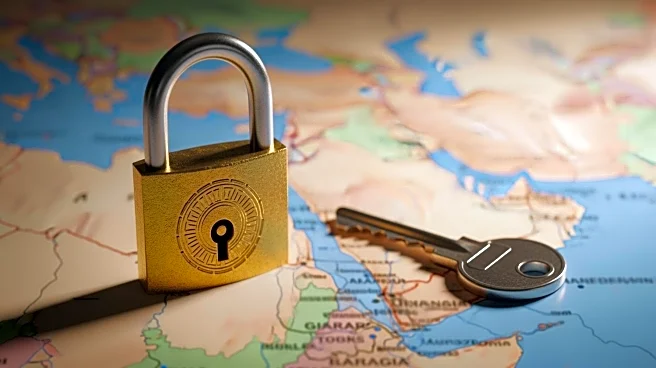What's Happening?
Israeli Prime Minister Benjamin Netanyahu has announced that the Rafah crossing between Egypt and Gaza will remain closed until further notice. This decision follows the Palestinian embassy in Cairo's announcement that the crossing would open on Monday.
The closure comes amid rising tensions and alleged violations of the ceasefire agreement between Hamas and Israel, which was part of President Trump's 20-point Gaza peace plan. The plan aimed to establish a lasting agreement after previous deals resulted only in temporary ceasefires. The situation remains tense as both sides accuse each other of violating the agreement, with Hamas criticizing Netanyahu's decision as a breach of commitments made to mediators.
Why It's Important?
The closure of the Rafah crossing is significant as it impacts the delivery of essential food and medical aid to Gaza, affecting thousands of Palestinians. The crossing has been largely closed since May 2024, and its reopening is crucial for humanitarian relief and mobility. The ongoing tensions and accusations of ceasefire violations threaten the stability of the region and the success of the peace plan. The United States has expressed concern over potential ceasefire violations by Hamas, which could undermine mediation efforts and lead to further conflict. The situation highlights the fragile nature of peace agreements in the region and the challenges in achieving lasting peace.
What's Next?
The continued closure of the Rafah crossing is expected to delay recovery efforts for hostages and exacerbate humanitarian conditions in Gaza. The U.S. State Department has warned of imminent ceasefire violations by Hamas, which could lead to protective measures for Gaza's civilians. The international community, including the United Nations, is likely to increase pressure on both sides to adhere to the ceasefire terms and facilitate aid delivery. The situation remains fluid, with potential for further diplomatic interventions to prevent escalation and ensure compliance with the peace agreement.
Beyond the Headlines
The closure of the Rafah crossing and the ongoing conflict in Gaza have broader implications for regional stability and international relations. The humanitarian crisis in Gaza, marked by widespread starvation and destitution, raises ethical concerns about the use of aid as leverage in political negotiations. The situation also underscores the challenges faced by international mediators in resolving long-standing conflicts and the need for comprehensive solutions that address underlying issues. The peace plan's success or failure could influence future diplomatic efforts in the region and impact global perceptions of conflict resolution strategies.















